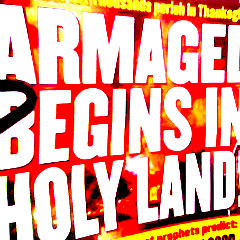If you’ve cancelled your plans on December 21 because the Mayans said the world would end, you’ll be excited to hear that calendar experts have finally announced that nothing will happen after all — except perhaps long lines at military-surplus return counters.
But look on the upside. Now you can use that newfound time to catch up on your reading — maybe thumb through some classics like Harold Camping’s recently overshadowed 1994? Or Hal Lindsey’s forgettable The 1980s: Countdown to Armageddon. Or perhaps the scratchings of William Miller. Or the Watchtower Society. Or Melchior Hoffmann.
They’ve all left their disappointed doomsday devotees. But turning a few pages can be instructive.
Solomon was right: There’s nothing new under the sun, including people eager to see it drop out of the sky. The turn of the first millennium after Christ had everyone buzzing about God rolling up the big scroll. And first-century Judaism sprouted more false messiahs than the San Francisco Bay Area in the 1970s.
Comets and conflagrations. Wars and their rumors. We’re always looking to the end. We are obsessed with it. Not that we don’t have cause. Christians see it in the scripture. We confess it in the creed. But obsession with the eschaton is as unbiblical as it is unhelpful.
Writes Paul, “Now concerning the coming of our Lord Jesus Christ and our assembling to meet him, we beg you, brethren, not to be quickly shaken in mind or excited, either by spirit or by word, or by letter purporting to be from us, to the effect that the day of the Lord has come” (2 Thes 2.1-2).
Paul penned this corrective to the church at Thessaloniki because they had already disregarded his previous teaching. “But as to the times and the seasons,” he said, “you have no need to have anything written to you. For you yourselves know well that the day of the Lord will come like a thief in the night” (1 Thes 5.1-2).
The desire for the end is a human impulse, born from the desire for resolution and closure. We are frail creatures, victims of the vicissitudes of life. We long for a means to settle that tension, to subtract ourselves from the crises in which we find ourselves. And the world seems weary, right? The times seem harder than ever. But practically every generation thinks this. Because we feel the impulse for closure as strongly as we do, we seek its confirmation everywhere — bad weather, bad politics, anything — never realizing that the failed prophets of previous generations were just grasping at the same, lame straws.
Paul told the Thessalonians to be sober and vigilant. And, importantly, he urged them “to aspire to live quietly, to mind your own affairs, and to work with your hands” (1 Thes 4.10-11). Keep your head down, do your work. Just be faithful to the Lord and wait. It may seem boring compared to Armageddon, but that’s the path we’re called to walk.
I’ve long been struck by these words of Dietrich Bonhoeffer:
[I]t only by living completely in this world that one learns to have faith. . . . I mean living unreservedly in life’s duties, problems, successes and failures, experiences and perplexities. In so doing we throw ourselves completely into the arms of God, taking seriously, not our own sufferings, but those of God in the world — watching with Christ in Gethsemane. That, I think, is faith; that is metanoia; and that is how one becomes a man and a Christian. . . . (Letters and Papers from Prison, 369-370)
Life’s duties and problems and perplexities are the things we keep trying to avoid. Nonetheless, they are the things that prove and develop our faith, which is arguably phony until tested by the trials of life.
We’re not meant to bail the world. We’re meant to work with Christ in redeeming it. That won’t happen until we scuttle our desire for escape and embrace Paul’s ethic of work and faithfulness. That is how we live like — and even in a sense become — Christians.













